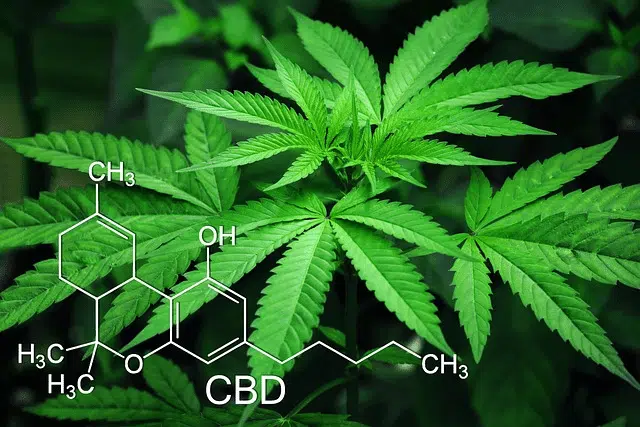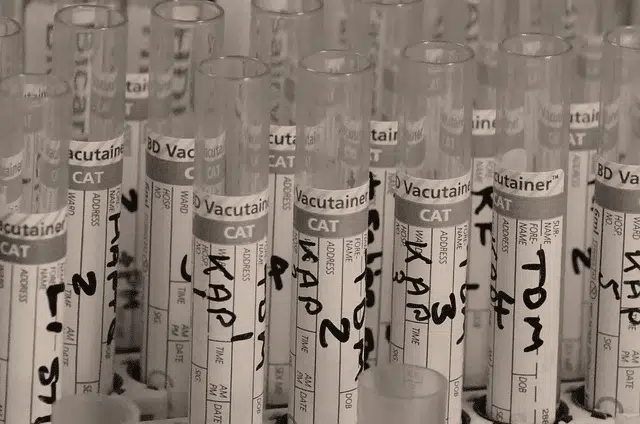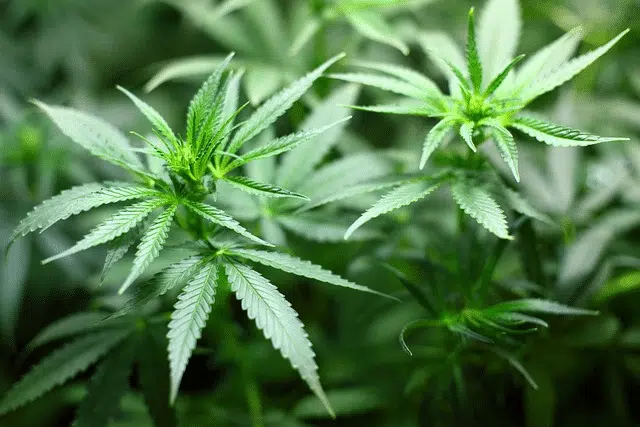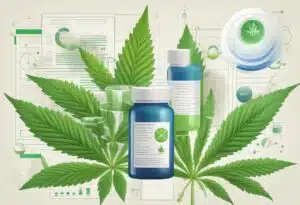As the world of cannabis continues to evolve, it’s essential to understand the various compounds within the plant. One such compound that has gained significant attention is THCA or tetrahydrocannabinolic acid.
But what exactly is this compound, and is THCA safe? Let’s explore the basics of THCA, potential health benefits, side effects, and legal aspects.
Key Takeaways
THCA is a non-psychoactive cannabinoid with potential therapeutic benefits and methods of safe consumption.
Individuals should take precautions when handling THCA products and adhere to recommended doses for safety.
Quality control and consulting a physician are essential for safely utilizing THCA products.
Understanding THCA: The Basics

THCA is known as tetrahydrocannabinolic acid. It is the precursor to THC, the main psychoactive compound in cannabis, and is produced by an enzyme called THCA synthase. When subjected to heat, THCA undergoes a chemical process known as decarboxylation and converts to THC, the psychoactive substance responsible for the “high” associated with marijuana.
Unlike THC, THCA does not bind to brain receptors with the same intensity, making it a non-psychoactive cannabinoid. It does not produce the intoxicating effects typically associated with marijuana use.
THCA has been suggested to offer potential therapeutic benefits, such as:
Treating chronic pain
Reducing inflammation
Alleviating nausea and vomiting
Suppressing appetite
Reducing muscle spasms
Treating seizures
Research into its health benefits is ongoing, but initial findings are promising. The most effective method of consuming THCA without experiencing THC’s psychoactive effects is ingesting raw cannabis flowers. This allows individuals to reap the potential health benefits without the intoxicating effects of marijuana use.
THCA Safety: Potential Side Effects

While THCA is generally deemed safe, awareness of potential side effects and risks is necessary. Possible adverse effects of THCA may include allergic reactions and implications associated with excessive consumption.
Allergic Reactions
Although rare, it is possible to experience allergic reactions to THCA found in unheated cannabis plants. Allergic reactions to cannabis can manifest in various ways, such as:
Itching
Redness
Hives
Runny nose
Cough
Congestion
More severe reactions like anaphylactic shock
These reactions may be caused by exposure to raw cannabis buds containing THCA, which interacts with cannabinoid receptors in the body.
To reduce the risk of allergic reactions to THCA, individuals prone to cannabis compound allergies should handle THCA products carefully and seek medical help if any symptoms of an allergic reaction appear. It’s important to remember that the cannabis plant contains various compounds that may cause allergies in some individuals.
Overconsumption
Moderation is vital when consuming THCA. Excessive consumption may result in undesirable effects, mainly if it is inadvertently converted to THC through a chemical reaction known as decarboxylation. This is how THCA converts in both marijuana and hemp plants, as both contain THCA.
To elude potential repercussions of overconsumption, adhering to recommended doses and moderate consumption of raw cannabis is advisable. When you consume raw cannabis, being mindful of the amount of THCA can help ensure a safe and beneficial experience without the risk of accidental conversion to THC.
Legal Aspects of THCA

The legality of THCA varies, depending on state laws and its categorization under the 2018 Farm Bill. This legislation classified hemp as a cannabis plant containing less than 0.3% THC by dried weight. As a result, THCA is permissible in the majority of states.
However, it’s important to note that the 2018 Farm Bill distinguished between hemp and marijuana plants based on their THC content. This distinction impacts the legal status of THCA in various states. As always, staying informed about the laws and regulations in your location is crucial to ensure compliance when using THCA products.
Methods of Consuming THCA Safely

Safe consumption is key to taking advantage of THC’s potential benefits without any psychoactive effects. This can be achieved by juicing raw cannabis, using THCA tinctures, and applying topical products.
Juicing Raw Cannabis
Juicing raw cannabis is an effective and safe method for consuming THCA. The process entails blending cannabis leaves and flowers with other fruits and vegetables to produce a juice. This approach maintains the THCA content of the cannabis and facilitates the easy absorption of the compound. Alternatively, raw cannabis tinctures can also be used for THCA consumption.
The advantages of juicing raw cannabis include:
Antioxidant and anti-inflammatory properties
Potential neuroprotective effects
Abundant nutrient profile comprising complete protein, Omega-3 and Omega-6 fatty acids, fiber, and vitamins
Consuming raw cannabis by juicing offers a safe and beneficial way to consume THCA without the psychoactive effects of THC.
THCA Tinctures
THCA tinctures are liquid extracts of cannabis that contain high concentrations of THCA. They offer a convenient and precise method of consumption without requiring the compound to be heated.
Utilizing THCA tinctures offers the following benefits:
Practical and regulated approach to consumption
Allows you to enjoy the potential benefits of THCA without the risk of converting it to THC through heat exposure
Provides an easy way to incorporate THCA into your daily routine
Maintains control over dosage and potency
Topical Applications
Topical applications of THCA can offer localized relief from pain and inflammation and manage skin conditions such as eczema and psoriasis. THCA can be applied topically through creams, salves, and oils.
However, testing a small skin area before applying THCA topically is crucial to ensure no adverse reactions occur. By following the appropriate precautions and using high-quality products, topical applications of THCA can provide targeted relief and potential benefits to the affected areas.
Health Benefits of THCA

Research indicates that THCA may boast a plethora of health benefits, including THCA benefits such as:
Anti-inflammatory properties
Neuroprotective properties
Anti-nausea properties
Inhibiting cancer cells
Preventing obesity
THCA has also shown promise in inhibiting cancer cells and preventing obesity.
The neuroprotective properties of THCA may be particularly beneficial in the prevention and treatment of conditions such as Alzheimer’s disease, Parkinson’s disease, and Huntington’s disease. Studies have demonstrated that THCA has the potential to protect neurons from damage.
This protection is attributed to its effect against inflammation and oxidative stress from a mutated form of the Huntington protein. Additionally, a 2017 study found that THCA had neuroprotective properties in mice, suggesting that it may have similar effects in humans.
Further research is needed to understand the extent of THCA’s health benefits fully, but initial findings are promising and warrant further exploration.
THCA and Drug Testing

THCA may appear on urine drug tests, but its detection in blood or hair tests is less probable. This is because urine drug tests can recognize THCA as it is metabolized into the same compound as THC’s metabolite. Blood and hair tests are currently unable to detect THCA. Other methods may be more suitable for determining its presence.
If drug testing is a concern, it’s advisable to steer clear of THCA products to diminish the risk of detection. While the consumption of THCA does not produce psychoactive effects, it’s essential to consider the potential implications of a positive drug test and make informed decisions based on your circumstances.
Quality Control and Sourcing THCA Products

Maintaining the quality and legality of THCA products is imperative, considering raw cannabis might harbor pesticides and other contaminants. To guarantee the safety, efficacy, and consistency of THCA products, it’s necessary to implement rigorous testing and quality control measures. This helps to ensure that the products are suitable for human consumption and meet regulatory standards.
When sourcing THCA products, choosing reputable suppliers and manufacturers, prioritizing quality control, and using high-quality ingredients or raw materials are essential. Doing so lets you trust the consistency and reliability of the THCA products you consume, providing accurate dosing and ensuring consumer satisfaction.
Precautions When Using THCA

Before venturing into the use of THCA, taking certain precautions is crucial for a safe and beneficial experience. Consult with a physician if you have a history of mental illness or are taking medications, as they can guide the appropriate use of THCA in your specific situation. Be mindful of potential side effects and interactions, such as dizziness, dry mouth, and an increased heart rate.
When combining THCA powder with a carrier oil, ensure the oil is high quality, and the dosage is precise. Additionally, if consuming an excessive dose of THC, be aware that it can result in anxiety, paranoia, and other undesirable side effects.
Exciting Potential Lies Ahead for THCA
As research on THCA progresses, this intriguing cannabinoid continues to display promising therapeutic potential. While more studies are still needed, initial findings suggest THCA may offer analgesic, anti-inflammatory, neuroprotective, and anti-nausea effects. Moving forward, larger clinical trials will shed light on the viability of THCA-based treatments for conditions like arthritis, nausea, neurodegenerative disorders, and more.
When used properly by consulting your physician, implementing quality control, and adhering to recommended dosing, THCA provides a compelling pathway to improved wellness. With care and precaution, individuals can unlock its possible benefits. Though questions remain, one thing is clear – THCA’s story is just beginning, and exciting possibilities lie ahead in cannabis medicine.
Frequently Asked Questions
What does THCA do to your body?
THCA has anti-inflammatory and pain-relieving effects, making it beneficial for treating symptoms of arthritis, seizures, multiple sclerosis, Alzheimer’s, and Parkinson’s disease.
Does THCA have side effects?
It appears that THCA may potentially have some side effects based on anecdotal reports of users feeling either drowsy or energized.
Further research is needed to explore this further.
What does THCA do to the brain?
THCA does not bind to receptors in the brain, but it does display neuroprotective properties that may help prevent and treat conditions such as Alzheimer’s, Parkinson’s, and Huntington’s.
It also has anti-inflammatory, anti-convulsant, and anti-seizure effects.
How powerful is THCA?
THCa is generally less potent than THC but can be converted into a more powerful compound when heated.
Certain suppliers offer THCa as crystals and concentrates, allowing it to be heated for potent results.






